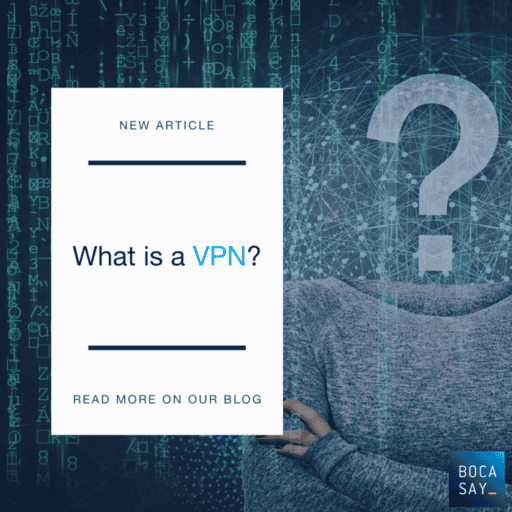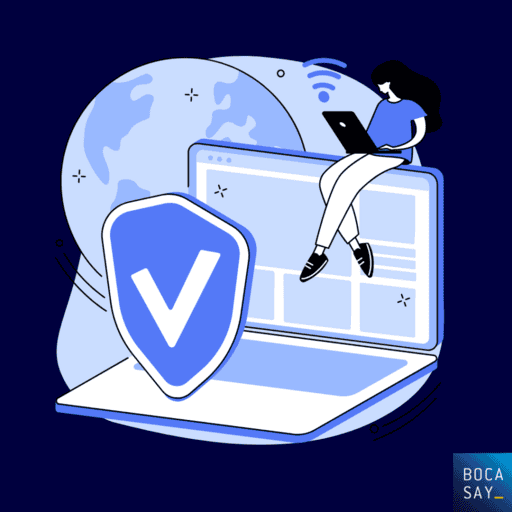What is a VPN?
In the current era of digital transition, more and more technologies are being developed to allow us to be more efficient, to have more comfort and to have more fun. But with our lives and our personal information being more and more “online”, we are more and more vulnerable to data hacking. Faced with new threats, new actions of counter-attack are set up. Your offshore web agency Bocasay explores VPNs.

What is a VPN?
VPN stands for “Virtual Private Network” and represents the ability to establish a secure network connection when using public networks. A VPN encrypts your Internet traffic and hides your online identity. It prevents unauthorized people from accessing Internet traffic and allows the user to protect his data. VPN technology is widely used in corporate environments, especially in the context of telecommuting, which has grown in recent years.
How does a VPN work?
A VPN works by routing your device’s Internet connection through the private VPN servers you choose, rather than through your Internet Service Provider (ISP), so that when data is sent over the Internet, it comes from your VPN, not your computer. A VPN acts as a kind of middleman when you connect to the Internet, hiding your IP address (the series of numbers your ISP assigns to your device) and protecting your identity. It becomes unreadable until it reaches its final destination.
A VPN creates a private “tunnel” between your device and the Internet and uses what is called encryption to hide your sensitive data.
Encryption hides information in such a way that it cannot be read without a very strong password called a key. This key effectively breaks down the complex code where the data has been transformed. Only your computer and the VPN server know this key.
What data is protected by a VPN?
Your personal data.
Obviously, the first reason to get a VPN is to protect your personal data. Data breaches, malware attacks and other online threats expose your information. They threaten your sensitive data like your login information, credit card details and online conversations.
A VPN uses a secure “tunneling” process and impenetrable 256 AES bit encryption for added security. Even the fastest and smartest computers would have a hard time cracking this encryption.
Your geolocation.
Using a VPN, you can hide your real physical location since you are connecting to a server in another country. If your real location is in Italy and you connect to a US VPN server, anyone trying to track your IP address will think you are somewhere in the US.
𝔹𝕖𝕔𝕒𝕦𝕤𝕖 𝕪𝕠𝕦𝕣 𝕓𝕦𝕤𝕚𝕟𝕖𝕤𝕤 𝕚𝕤 𝕦𝕟𝕚𝕢𝕦𝕖, 𝕖𝕢𝕦𝕚𝕡 𝕪𝕠𝕦𝕣𝕤𝕖𝕝𝕗 𝕨𝕚𝕥𝕙 𝕔𝕦𝕤𝕥𝕠𝕞𝕚𝕫𝕖𝕕 𝕕𝕚𝕘𝕚𝕥𝕒𝕝 𝕤𝕠𝕝𝕦𝕥𝕚𝕠𝕟𝕤. 𝕐𝕠𝕦𝕣 𝕠𝕗𝕗𝕤𝕙𝕠𝕣𝕖 𝕨𝕖𝕓 𝕒𝕘𝕖𝕟𝕔𝕪 𝔹𝕠𝕔𝕒𝕤𝕒𝕪 𝕕𝕖𝕧𝕖𝕝𝕠𝕡𝕤 𝕗𝕠𝕣 𝕪𝕠𝕦, 𝕔𝕦𝕤𝕥𝕠𝕞 𝕤𝕠𝕗𝕥𝕨𝕒𝕣𝕖 𝕒𝕟𝕕 𝕒𝕡𝕡𝕝𝕚𝕔𝕒𝕥𝕚𝕠𝕟𝕤, 𝕤𝕦𝕔𝕙 𝕒𝕤 𝕒 𝕍ℙℕ, 𝕥𝕠 𝕒𝕔𝕔𝕠𝕞𝕡𝕒𝕟𝕪 𝕪𝕠𝕦 𝕚𝕟 𝕥𝕙𝕖 𝕕𝕖𝕧𝕖𝕝𝕠𝕡𝕞𝕖𝕟𝕥 𝕠𝕗 𝕪𝕠𝕦𝕣 𝕓𝕦𝕤𝕚𝕟𝕖𝕤𝕤. ℂ𝕠𝕟𝕥𝕒𝕔𝕥 𝕦𝕤 𝕗𝕠𝕣 𝕞𝕠𝕣𝕖 𝕚𝕟𝕗𝕠𝕣𝕞𝕒𝕥𝕚𝕠𝕟. ℕ𝕠 𝕠𝕓𝕝𝕚𝕘𝕒𝕥𝕚𝕠𝕟 !
Your IP address.
Communication over the Internet is based on the exchange of IP addresses. Your IP address reveals details about you, such as your Internet Service Provider (ISP), city, region or country.
While this is not enough to identify your exact location and physical address, your ISP, the websites you visit, online applications and even government agencies can track everything you do online if they know your IP address.
Powerful loggers connect the dots to create your personalized digital profile. Your digital profile contains everything about you and your online activity. This includes how often you use Facebook, when you apply for a new job, where you go on vacation, etc.
Malicious people could use this information to send spam or targeted advertisements to you.
Masking your IP address helps prevent online tracking. This means that no one can track you based on your IP address.
Your search history.
A VPN hides your search history from your ISP, government entities and cybercriminals. Once it encrypts your Internet traffic, your online data passing through the VPN server becomes undecipherable code. It is virtually impossible for anyone to crack the code and understand what you are doing online.
That said, your default web browser can still see your online searches when you connect to a VPN. If you have a Google account, for example, every time you are logged in and search for something on Chrome, the web browser can see your online searches. This is true even when you are connected to a VPN. However, websites still can’t link your searches to your IP address.
Your downloads.
When you share or download files, your identity is exposed. Your IP address is the first thing that shows up in your ISP’s data logs because you use so much bandwidth. The government and advertisers can also track your download activity.

What are the advantages of a VPN connection?
Among the many benefits of using a VPN, we can mention a few:
Access more online content.
Some websites or applications place geo-restrictions, allowing only users from certain countries to access or view their content. When you connect via a VPN server, you can change your IP address to bypass censorship or maintain access to your favorite websites from abroad.
Get better prices.
Websites or services show you different prices for the same items depending on your location. Change your IP address to one in another location and you’ll discover the best possible prices or deals.
Have a secure connection for remote work.
With more people working from home than ever before, sensitive company and customer information is at greater risk of theft.A leak of company files and to customer information can be catastrophic to a business. Using a VPN to connect to corporate networks can help ensure that sensitive data is protected by VPN encryption.
Why develop a custom VPN for your business?
Every business is unique, and so are its processes and needs. As a company, you have a responsibility to protect your customers’ data, but you also have a responsibility to preserve your company’s data. Calling on professionals like Bocasay offshore web agency to develop your own custom VPN is to ensure maximum protection. Moreover, equipping yourself with digital solutions that fit your needs is a smart long-term investment. You only pay for the features that are useful to you, and you can upgrade your VPN as your business evolves.